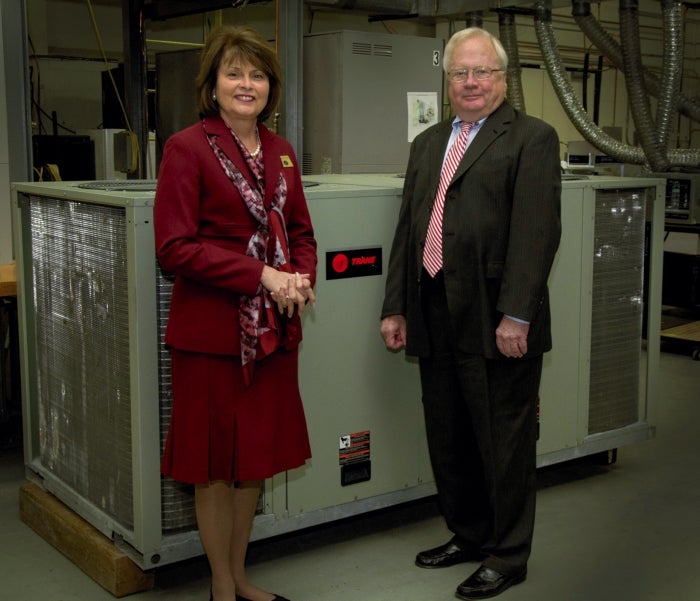Rowan-Cabarrus program receives equipment donation
Published 12:00 am Thursday, February 26, 2015

- Rowan-Cabarrus Community College President Dr. Carol Spalding stands with Phil Kirk, director of business and leadership development for Brady, in front of the air conditioning unit donated. Submitted.
Brady Services of Greensboro has donated equipment to help train Rowan-Cabarrus Community College students in heating and air technology.
“Industry-recognized, high-tech equipment is critical to the success of our program and our graduates,” said Joe Christie, chair of the Air Conditioning, Heating and Refrigeration Technology program at Rowan-Cabarrus. “If students can’t leave here knowing how to use the equipment that an employer uses, they won’t be as successful as the job requires.”
Students having access to equipment – such as air conditioning units, furnaces, heat pumps – for training purposes is critically needed to make them more marketable and employable.
“Training these skilled technicians and entrepreneurs is a critical part of the Rowan-Cabarrus Community College mission and Brady just made that easier,” said Dr. Carol S. Spalding, president of the College.
Brady is a comprehensive energy solutions company with offices in Greensboro, Raleigh, Charlotte, Durham, Wilmington and Fayetteville.
“Brady is pleased to partner with Rowan-Cabarrus Community College by providing this piece of equipment which can be used to teach HVAC technicians. Most of the technicians we hire are graduates of community colleges in North Carolina, and we want to do our part in making sure they are trained on the best possible equipment,” said Phil Kirk, director of business and leadership development for Brady.
The air conditioning, heating and refrigeration technology curriculum provides the basic knowledge to develop skills necessary to work with residential and light commercial systems.
According to the U.S. Bureau of Labor Statistics, employment of heating, air conditioning, and refrigeration mechanics and installers is projected to grow 21 percent from 2012 to 2022, faster than the average for all occupations.
The donated unit from Brady in Greensboro is part of an air-conditioning split system that is located outdoors. The unit, a TRANE Odyssey condensing unit with 15 tons of nominal cooling, retails for $7,500.
“This high job growth creates a need for intensive vocational training in air conditioning, heating and refrigeration, leading students to become skilled technicians in their field,” Christie said.
More than 100 certifications, diplomas and degrees have been awarded to students in the AHR field over the last year.
“Brady has a long history of public-private partnerships with our community colleges,” said Kirk. “We are pleased with the quality of graduates we receive, but know they must be trained on up-to-date equipment.”
The Rowan-Cabarrus courses include mechanical refrigeration, heating and cooling theory, electricity, controls, and safety. The diploma program covers air conditioning, furnaces, heat pumps, tools and instruments. In addition, the associate in applied science degree in Air Conditioning, Heating & Refrigeration Technology covers residential building codes, residential system sizing and advanced comfort systems.
“This will absolutely be helpful to us in the future. Once we are able to secure an air-handler to compliment this system, we’ll be able to use this wonderful piece in our commercial level classes,” said Dr. Van Madray, dean of engineering and business technology for the college. “We are grateful to have it.”
In addition to the complimentary air handler, the program is in need of updated residential heat pump lab equipment, a walk-in cooler, and a supermarket simulation refrigeration system.
“I really want to thank Brady for their generous donation. This is a great example of public-private partnership,” said Spalding. “One of the college’s biggest challenges is keeping our programs equipped with industry-recognized, state-of-the-art equipment that is used in the workplace. This donation will help us in achieving that goal.”
Unfortunately, the college’s funding does not include an abundance of resources for equipment investments.
“Like many public organizations, we are looking at options outside of traditional tax dollars to keep moving forward. Working with industry partners, we have assessed our needs and developed a case for support to seek private and philanthropic donations,” said Carla Howell, chief officer of foundation, governance and public relations at the college.
Strengthening the “fundraising muscle” of the college’s foundation is not only important for the immediate future, but also for the long term vitality of the college, and the tens of thousands of students it serves each year.


